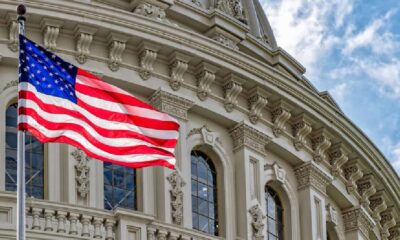News
UK court to hear final Assange appeal against extradition to US

By Francesca Hangeior
The High Court in London Tuesday will begin hearing WikiLeaks founder Julian Assange’s final UK appeal against extradition to the United States to face trial over publishing secret military and diplomatic files.
Washington wants the 52-year-old Australian citizen extradited after he was charged there multiple times between 2018 and 2020 in connection with WikiLeaks’ 2010 publication of files relating to the US-led wars in Iraq and Afghanistan.
The long-running legal saga in Britain’s courts is now nearing a conclusion, after Assange lost successive rulings in recent years.
If this week’s two-day bid to appeal set to begin at 10:30 am (1030 GMT) Tuesday is successful, he will have another chance to argue his case in a London court, with a date set for a full hearing.
If he loses, Assange will have exhausted all UK appeals and will enter the extradition process, although his team have indicated they will appeal to European courts.
His wife Stella Assange has said he will ask the European Court of Human Rights to temporarily halt the extradition if needed, warning he would die if sent to the United States.
“Tomorrow and the day after will determine whether he lives or dies essentially, and he’s physically and mentally obviously in a very difficult place,” she told BBC radio on Monday.
US President Joe Biden has faced sustained pressure, both domestically and internationally, to drop the 18-count indictment Assange faces in federal court in Virginia, which was filed under his predecessor Donald Trump.
Major media organisations, press freedom advocates and the Australian parliament are among those decrying the prosecution under the 1917 Espionage Act, which has never been used before over publishing classified information.
But Washington has maintained the case, which alleges Assange and others at WikiLeaks recruited and agreed with hackers to conduct “one of the largest compromises of classified information” in US history.
Assange, detained in the high-security Belmarsh Prison in southeast London since April 2019, was arrested after spending seven years holed up in Ecuador’s London embassy.
He fled there to avoid extradition to Sweden, where he faced accusations of sexual assault which were later dropped.
The High Court had blocked his extradition, but then reversed the decision on appeal in 2021 after the United States vowed to not imprison him in its most extreme prison, “ADX Florence”.
It also pledged not to subject him to the harsh regime known as “Special Administrative Measures”.
In March 2022, the UK’s Supreme Court refused permission to appeal, arguing Assange failed to “raise an arguable point of law”.
Months later, ex-interior minister Priti Patel formally signed off on his extradition, but Assange is now seeking permission to review that decision and the 2021 appeal ruling.
If convicted in the United States, he faces a maximum sentence of 175 years in jail.
Kristinn Hrafnsson, WikiLeaks’ editor-in-chief, told reporters last week that caveats included within the US promises meant they were “not worth the paper they are written on”.
On the same day, Australia’s Prime Minister Anthony Albanese denounced the years-long legal pursuit of Assange, saying “enough is enough”.
It followed the country’s parliament passing a motion calling for an end to his prosecution.
News
Presidency slams El-Rufai over plot to woo Buhari

The Presidency and the ruling All Progressives Congress have dismissed the prospect of any opposition coalition unseating President Bola Tinubu in 2027, describing recent moves by former Vice President Atiku Abubakar and ex-Kaduna State Governor, Nasir El-Rufai, as futile and politically opportunistic.
Their reactions followed the high-profile visit by Atiku and El-Rufai—accompanied by former governors Aminu Tambuwal (Sokoto), Gabriel Suswam (Benue), Jibrilla Bindow (Adamawa), and Achike Udenwa (Imo)—to former President Muhammadu Buhari at his Kaduna residence last week.
Although Atiku maintained the visit was merely a post-Sallah courtesy call, political observers and members of the ruling party believe it was part of broader opposition coalition talks aimed at weakening Tinubu’s political base.
“There is a plan for the major political parties to come together and form a strong opposition. But it is not part of our visit,” Atiku told reporters.
In recent weeks, concerns have risen within the APC over speculated coalition efforts and the potential exit of the Congress for Progressive Change bloc from the party, following defections to the Social Democratic Party.
But the APC’s National Secretary, Senator Ajibola Bashiru, waved off the speculations in a phone interview with The PUNCH, questioning the credibility of the so-called CPC defection narrative.
“It is not true. Which CPC bloc did you people say is leaving? Was El-Rufai or Atiku a CPC member? Is our Vice National Chairman (North-West), Garba Datti Mohammed, and even former Governor Al-Makura not in the CPC? Have you heard any of them saying he is leaving?” Bashiru queried. “I don’t know why the media keeps giving these sorts of people unnecessary attention.”
Also reacting, President Tinubu’s Special Adviser on Policy Communication, Daniel Bwala, criticised the coalition talks, dismissing them as a desperate power grab by political misfits with no shared ideology.
“This coalition is an association to grab power,” Bwala said. “That’s why you will hear Peter Obi say they are only there to grab power. Tomorrow, he will say he is considering joining. As for my senior brother, El-Rufai, I like what he is doing. He is using them to play ping pong.”
Bwala added that internal resistance within the Peoples Democratic Party had already disrupted El-Rufai’s attempts to lure the opposition into the SDP.
“When El-Rufai came, he thought he would move all of them to SDP. But His Excellency (Sule Lamido) screamed, ‘Hold it there!’ He reminded them that it was the PDP that made El-Rufai minister twice and gave him political relevance. Now, he wants to drag them out? We’re not going anywhere,” Bwala recounted.
The Presidency insists that despite the rising political noise, President Tinubu remained focused on governance and would not be distracted by alliances it described as unstable and self-serving.
Credit: PUNCH
News
Court dismisses suit seeking Oyo monarch’s removal

An Oyo State High Court sitting in Ibadan has dismissed a suit contesting the nomination and installation of the Olugbon of Orile Igbon, Oba Francis Alao.
In his ruling on Monday, Justice K.A. Adedokun nullified the case for lack of jurisdiction.
Four members of the Akingbola family who instituted the suit contested the selection, appointment, and approval of Oba Alao as the Olugbon.
Justice Adedokun held that the court lacked the jurisdiction to entertain the matter, saying that the claimants had no locus standi to file the suit.
He ruled that the case was defective as it failed to include Surulere Local Government, the authority legally empowered to initiate the selection process and approve the traditional ruler’s appointment.
Oba Alao, whose installation as Olugbon was ratified by the Oyo State government and traditional institutions, is the current vice chairman of the Oyo State Council of Obas and Chiefs.
News
EFCC arraigns Chinese for giving false information in Lagos

The Economic and Financial Crimes Commission (EFCC) has arraigned a Chinese, Liu Beixiang, over alleged false information to an officer of the agency.
Liu was arraigned yesterday before Justice Ayokule Faji of the Federal High Court sitting in Ikoyi, Lagos.
The charge reads: “That you, Liu Beixiang (a.k.a Lao Liu), sometime in December 2024 in Lagos, within the jurisdiction of this honourable court, did give information, which you knew to be false, to an officer of the Federal Government of Nigeria in the discharge of his duties and thereby committed an offence contrary to Section 16 (1) of the Economic and Financial Crimes Commission (Establishment) Act, 2004.”
The defendant, however, pleaded not guilty to the offence when the charge was read to him. In view of his plea, the prosecution counsel, Babatunde Sonoiki, asked the court for a trial date and also prayed that the defendant be remanded in a correctional facility.
But in his response, the defence counsel, F.A. Dalmeda, informed the court of an application submitted to the EFCC seeking a plea bargain.
“We filed an application for a plea bargain, and we also filed a motion for bail, which the EFCC responded to this morning.
“We need a date for us to report on the plea bargain.
Consequently, Justice Faji adjourned the matter till June 23, 2025, for a report on the plea bargain and remanded the defendant in a correctional centre.
-

 News18 hours ago
News18 hours agoJust in: Namibia Moves to Deport Over 500 Americans in Bold Visa Policy Shift
-

 News18 hours ago
News18 hours agoRivers women rally in support of state of emergency
-

 News13 hours ago
News13 hours agoYou must refund N300m, Rivers State tells NBA
-

 Politics17 hours ago
Politics17 hours agoBwala accuses Senator Ndume of plans to defect from APC
-

 Foreign14 hours ago
Foreign14 hours agoUS orders 30-day registration for all foreign nationals or face jail, deportation
-

 News18 hours ago
News18 hours agoSoldiers rescue 16 kidnapped passengers in Plateau
-

 News18 hours ago
News18 hours agoGunmen invade Plateau community in fresh attack, Kill 40 People
-

 News16 hours ago
News16 hours agoPolice sack officer who killed one, injured two in Calabar





